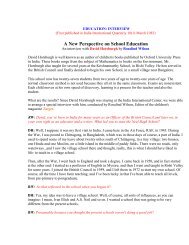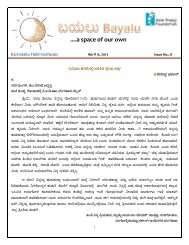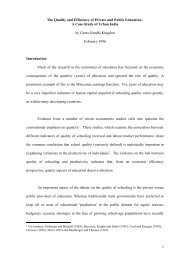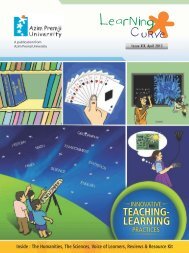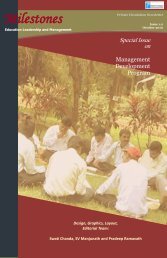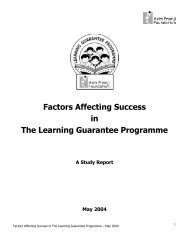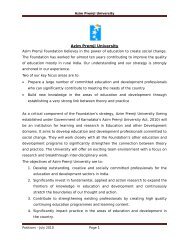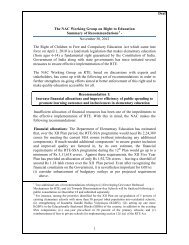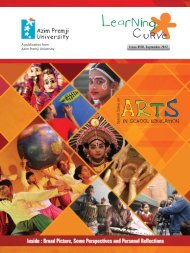Indesign Pagesnew.indd - Azim Premji Foundation
Indesign Pagesnew.indd - Azim Premji Foundation
Indesign Pagesnew.indd - Azim Premji Foundation
You also want an ePaper? Increase the reach of your titles
YUMPU automatically turns print PDFs into web optimized ePapers that Google loves.
to us that at every moment of our lives as engineers, doctors,<br />
accountants, teachers, and indeed in every activity and<br />
profession, not the least as academics, there are continuities<br />
between ourselves and the world which we can ignore<br />
only at our peril. Like every teenager who accessed ideas,<br />
understandings and experiences through fi ction, poetry and<br />
art, it stands to reason that it is through the humanities that<br />
our sciences, as much as our lives, become genuinely social,<br />
deeply humanitarian.<br />
The case for the larger liberal arts has been made, and<br />
made well, by others. Among these are that they cultivate<br />
well-rounded citizenry, encourage critical thinking and public<br />
discussion and make us understand motivations other than<br />
our own in the pursuit of living. Despite all these stellar<br />
qualities that an education in the liberal arts can cultivate,<br />
they are defi nitely being bullied out of our educational<br />
systems by the big brothers science and technology (and<br />
step brother management). Our youth are getting specialised<br />
education at an even younger age - the best example (or<br />
worst one, depending on your perspective) being that<br />
of an undergraduate degree being offered in Business<br />
Management, making a mockery of education itself. Yet it is<br />
the liberal arts which are being edged out in one way or the<br />
other from education when it is blatant that we need them<br />
more, not less.<br />
While there are major benefi ts of including the social<br />
sciences in education, yet teaching of the social sciences<br />
is not a simple task. According to the National Curriculum<br />
Framework 2005, for instance, one of the major problems is<br />
that an utilitarian approach has been used in the teaching<br />
of the social sciences, whereby the individual is regarded<br />
as an instrument of development. It recommends a shift<br />
to a normative approach so that issues of equality, justice<br />
and dignity of society are emphasized in order to awaken<br />
a real concern for social justice among students. What the<br />
NCF does not address is how this is to be achieved. We<br />
need our sciences, including our social sciences, to more<br />
deeply embrace the humanities and regain the synergies<br />
lost between them. It is through the deeper engagement<br />
between the humanities and the social sciences that the<br />
liberal arts can become relevant again in education.<br />
Surprisingly, this struggle between utilitarianism and<br />
egalitarianism seems to fi nd echoes in the world of work, the<br />
“real world” if you will. Here though, the opposite is the case<br />
Section E<br />
The Importance of Being “Useless”<br />
and the liberal arts, which the curriculum considered too<br />
infl uenced by utilitarianism, are ironically deemed to be of<br />
largely no use. Thus, there are few jobs for even the best of<br />
such graduates, and almost no career paths in organisational<br />
life for them to grow in outside of academics and NGOs. The<br />
world of work still believes that the graduates they hire,<br />
(ironically even the S&T graduates, but somehow these are<br />
accommodated in organisations), are of little use to them.<br />
Several arguments from other disciplinary backgrounds have<br />
also come to the defence of the liberal arts but listen to<br />
what one such well-intentioned but misguided commentator<br />
attempting to make a case for the humanities in no less<br />
than The New York Times tells us: “You will have enormous<br />
power if you are the person in the offi ce who can write a<br />
clear and concise memo.” Leaving aside the fact that no one<br />
studies the humanities in order to possess a dubious skill like<br />
writing a memo well, by reducing the larger knowledge base<br />
on which the liberal arts rest to a set of “skills” (worse, “soft<br />
skills”) the world of work does us an enormous disservice.<br />
The world of work demands “skill sets” and the ability to<br />
“deliver” without realising that in order for these to be<br />
improved what we need is more, not less, liberal education<br />
for every one.<br />
Unfortunately, in an attempt to cater to<br />
the needs of world of work, the world of<br />
education (the world of ideas if you will,<br />
where knowledge is constructed) strives to<br />
improve itself through the imposition of<br />
an even more socially isolated curriculum<br />
and an uncritical pedagogy in an attempt<br />
to be effi cacious.<br />
Unfortunately, in an attempt to cater to the needs of world of<br />
work, the world of education (the world of ideas if you will,<br />
where knowledge is constructed) strives to improve itself<br />
through the imposition of an even more socially isolated<br />
curriculum and an uncritical pedagogy in an attempt to be<br />
effi cacious. Thus, knowledge divorced from the world is as<br />
rampant in medicine, engineering, management, sciences<br />
Pg No: 123



